
Editor’s Note: The article is part of our series Gaza Diaries which shares firsthand accounts of Palestinians who lived through the 11-day Israeli attack on Gaza in May 2021, and are now dealing with its aftermath. You can read the entire series here.
For the first time, I’m not sure I can manage to finish a dispatch. Last month, death loomed closer than a walk to the bathroom. It did not matter where I was inside Gaza, every place in this small territory of 140.9 square miles was proximal to shelling and airstrikes.
Hostilities escalated on May 10, 2021, and came to a close in a ceasefire brokered by Egypt 11 days later, but I am still thinking about the six days after I fled my home in Shuja’iyya, a neighborhood in the east of Gaza. In total, my family and I were uprooted twice during the fighting. Each time with more relatives in tow, we rushed out the door with only a moment’s notice and joined the exodus in the streets that spanned as far as the eye could see across Gaza’s flat roads.
I live in a residential area that is adjacent to the buffer zone with Israel. Days into what started as strikes from Israeli jets and rockets from Gaza, Israeli forces opened fire from the ground and sea. Explosives rained from the west and east, and of course the sky. My sister, who lives closer to the border, came to take shelter in my home.
In the first days of the war, the adults and older teenagers taught the kids a few tricks to attempt to block out the sounds of the blasts. We could dilute the noise, but the impact shook the walls and floors and us on them.
My mother, who is 80 years old, always says, “since I was born until now, we live somewhere between fleeing our home and wars and death.”
We also attempted to calm my mother who is 80 years old and blind. She has witnessed half a dozen wars and at least a dozen of escalations in her lifetime. She always says, “since I was born until now, we live somewhere between fleeing our home and wars and death.”
When we fled the first time it was a Friday and the first evening of Eid al-Fitr, a celebration that closes the Muslim holy month of Ramadan. That morning, the fathers in the building tried to forge a festive atmosphere for the kids. Ordinarily, children dress in new clothes received in elaborately packaged gits, and families host dinner parties that are more like sumptuous feasts. We kept the children busy, happily playing outside. At that point, bombs were already audible but in the distance. We lied and told them the blasts were fireworks for Eid. We said, “you have to have fun today.”
In the evening we gathered for the meal and I peered at the most lovely and innocent faces, my nieces and nephews. Most of them do not know what a missile is, but unfortunately, they have seen images of Palestinian children their age torn apart from airstrikes, despite our efforts to shield them from graphic content that aired on the news and was shared on social media.
As we ate, a cacophony of shouts spilled from the road to our dinner table. A neighbor stormed the front door and yelled at us: “you must flee now, there is no time! They,” he said of Israeli forces, “have plans for a ground invasion. Leave now!”
That night a rumor of an impending invasion had circulated on social media after the Israeli military posted on its official Twitter account that it was attacking from the ground. Hours later we would learn they did not enter Gaza but shelled from the ground on the other side of the demilitarized buffer zone. No matter for us, we were close enough to the border to be in the firing line.
I looked to the street to see it crowded; men held kids on their shoulders and in their arms, barefoot women followed. It was heartbreaking.
Everyone readied to leave, everyone had a survival bag.
I tried to control my panic and in a blink, I grabbed a bag with the most important item I have with me now, my laptop. Also tucked inside were my phone, chargers, and my official documents. Everyone readied to leave, everyone had a survival bag.
We put my parents and the other older adults in the car with as many of the smaller kids as possible and they headed westward toward my aunt’s house, who was already hosting her adult children and their families.
It was the fourth day of fighting and the first place we could think of.
My aunt lives in a pleasant five-story building along with her four brothers, their families, and her parents. The home is located in al-Rimal, a short walk from the sea. Before the Egyptian and Israeli siege began in 2007, al-Rimal was an upscale neighborhood in the Strip’s most populous urban center, Gaza City.
Her apartment felt small with more than 30 children on the floor mostly split between a small room and corridor. Some were in shock and were inconsolable.
Overnight, when airstrikes were the fiercest, each blast rattled the building and left us deaf for a matter of seconds. One hit, then another, and another, and so on. Some of the women shouted prayers for safety.
All the kids were still wearing the new Eid clothes. Their faces were a dull yellow. Even when I could control my panic, looking at their faces zapped me with emotions of terror and anxiety. It’s indescribable to see a child fearing for their life, let alone every single child in your family.
Two days later, we decided to separate into groups. My sisters-in-law took their kids to their families’ houses, we found a different spot for the older parents, while my eldest brother, his two sons, and I went back to our home in Shuja’iyya. We had the realization that there is no place safer than the next, and it would be prudent of us to divide the family, thus ensuring at least some of us would survive in the event an airstrike impacted our family.
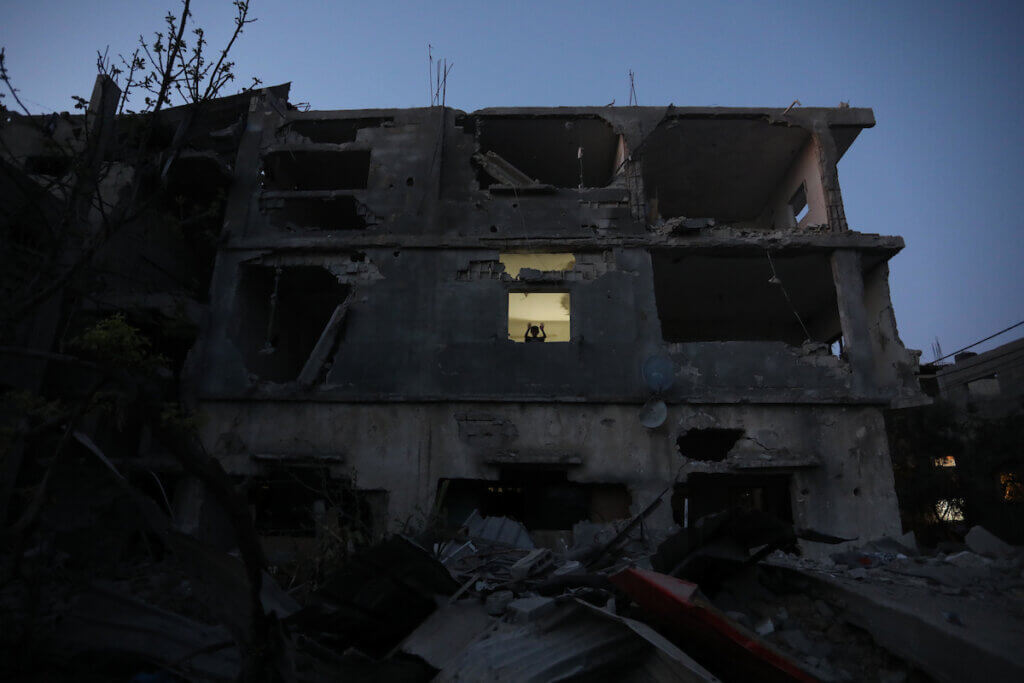
When I walked into the house I found it dark and empty. No more children laughing, which I quickly began to miss. The electricity was out as several cables feeding Gaza’s only power plant were struck by the Israeli military. It took two days for the lights to turn back on, which meant my laptop wouldn’t power on for the first 48 hours I was home.
After nightfall, shelling puckered the house. In the daytime hours, I reported in the streets and at medical facilities. In one hospital, there was a father whose entire family was killed in an airstrike. I wondered when I saw him how he will manage. He spent his entire life making a family and in the blink of an eye, they vanish from the earth by way of a missile.
I saw a little girl of 8 or 10 who was stuck beneath rubble for 8 hours. She survived. I saw the corpses of an immediate family. There was no interview to gather about what happened, just bodies.
By the end of the war, Israeli forces would kill 245 Palestinians, including 66 children and Palestinian rockets killed 12 in Israel including two children and two Thai nationals. As a journalist, I felt shame over how emotional I became. I keep asking myself one question: what kind of a place is this to live where so many are killed so quickly? In the hospital, I only saw civilians.
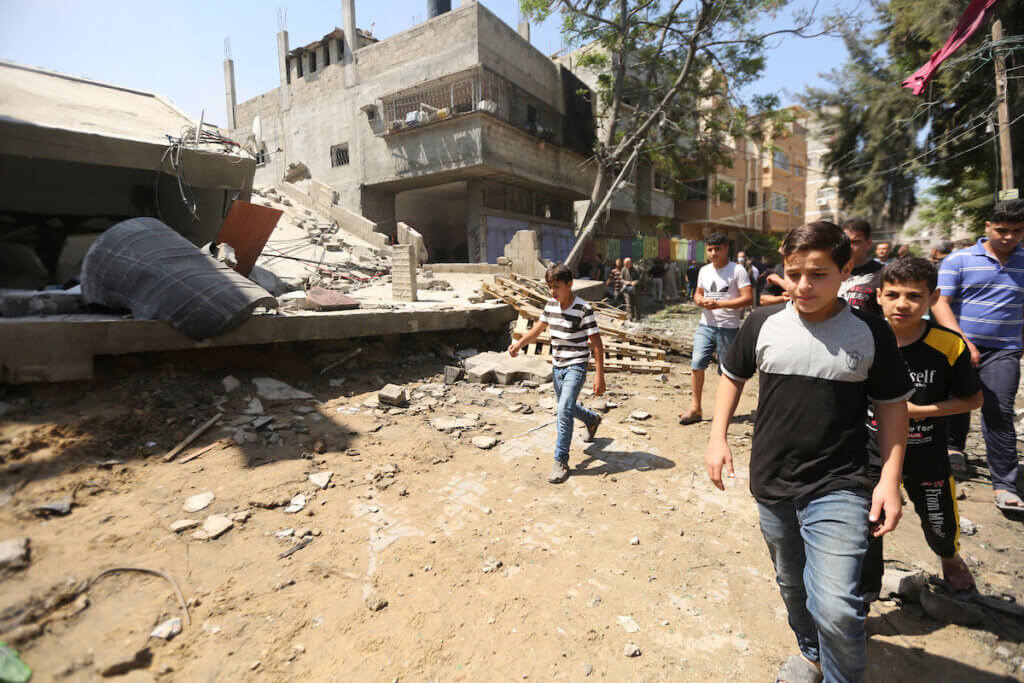
If I’m honest about my future, I know this is not the last war I will live through. Already I’ve witnessed similar experiences in 2014, 2012, 2008-09, and 2000. It seems like every few years the same situation circles back.
There is no equivalence between the damage done in Israel and the destruction in Gaza. Our society stopped and we were already in a humanitarian crisis. As my mother would say, “we will live and die in wars.”
Almost two weeks after that moment in the hospital, people have already gone back to their houses. The United Nations estimates around 9,000 are still homeless. Some have claimed the ceasefire as a victory, some say it is a victory that they are still alive.
As for me, I haven’t slept more than two hours a night since mid-May. It’s like when a person spends a long day at the sea, and hours later instead of slumber, they feel the sensation of swimming or tumbling in the surf even though they and their bedroom are far from resplendent waves crashing onto white sands. That is me now, except when I close my eyes, I feel the reverberation of an explosion that is nowhere to be found but inside my head.
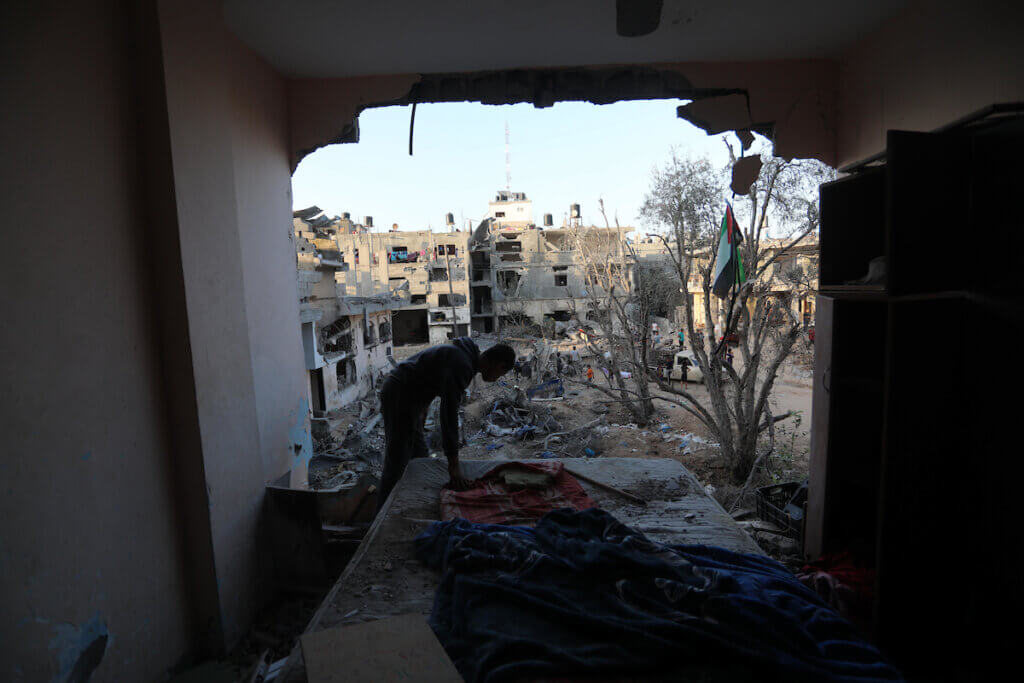

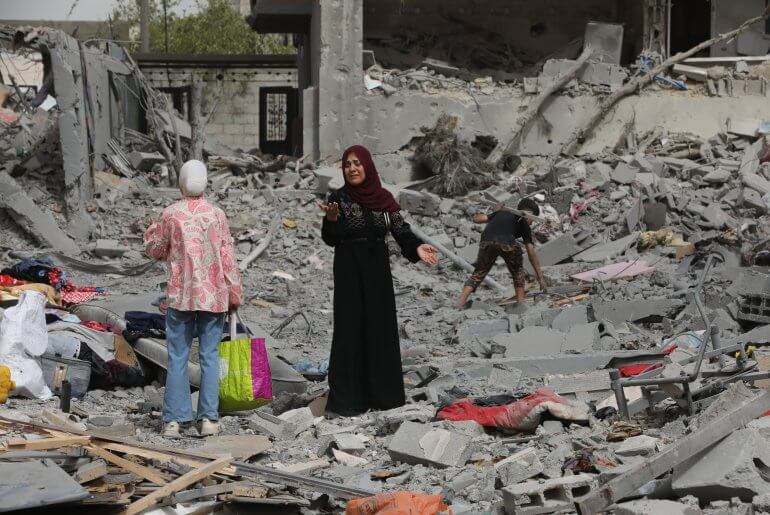
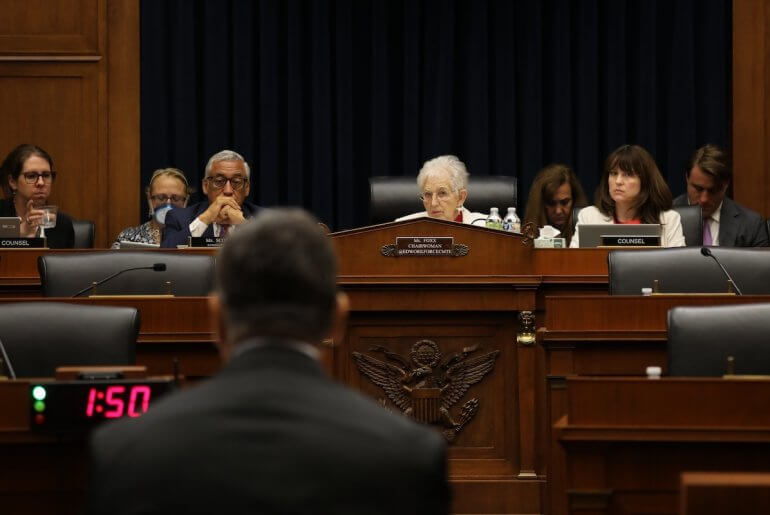
Relevant article: “Why did Israel bomb bookstores?”
https://electronicintifada.net/content/why-did-israel-bomb-bookstores/33311
Israel has a history of attacking Palestinian arts and culture…In 2018, for example, Israel bombed the Said al-Mishal Cultural Center. That five-story building hosted Gaza’s main theater, as well as dance classes, poetry readings and exhibitions….During last month’s attack, Israel also bombed the Ghazi al-Shawa building hosting the Gaza offices of Open Screenplay. A Canadian firm, Open Screenplay has developed technology to assist budding movie writers.
1 of 2
MUST READ!!!!
Chris Hedges: Israel, the Big Lie – scheerpost.com
Scheer Post, May 14/21
“Chris Hedges: Israel, the Big Lie”
BRIEF EXCERPT:
“Israel is not exercising ‘the right to defend itself’ in the occupied Palestinian territories. It is carrying out mass murder, aided and abetted by the U.S.”
“Nearly all the words and phrases used by the Democrats, Republicans and the talking heads on the media to describe the unrest inside Israel and the heaviest Israeli assault against the Palestinians since the 2014 attacks on Gaza, which lasted 51 days and killed more than 2,200 Palestinians, including 551 children, are a lie. Israel, by employing its military machine against an occupied population that does not have mechanized units, an air force, navy, missiles, heavy artillery and command-and-control, not to mention a U.S. commitment to provide a $38 billion defense aid package for Israel over the next decade, is not exercising ‘the right to defend itself.’ It is carrying out mass murder. It is a war crime.
“Israel has made it clear it is ready to destroy and kill as wantonly now as it was in 2014. Israel’s defense minister Benny Gantz, who was the chief of staff during the murderous assault on Gaza in 2014, has vowed that if Hamas ‘does not stop the violence, the strike of 2021 will be harder and more painful than that of 2014.’ The current attacks have already targeted several residential high rises including buildings that housed over a dozen local and international press agencies, government buildings, roads, public facilities, agricultural lands, two schools and a mosque. (cont’d)
2 of 2
“I spent seven years in the Middle East as a correspondent, four of them as The New York Times Middle East Bureau Chief. I am an Arabic speaker. I lived for weeks at a time in Gaza, the world’s largest open-air prison where over two million Palestinians exist on the edge of starvation, struggle to find clean water and endure constant Israeli terror. I have been in Gaza when it was pounded with Israeli artillery and air strikes. I have watched mothers and fathers, wailing in grief, cradling the bloodied bodies of their sons and daughters. I know the crimes of the occupation—the food shortages caused by the Israeli blockade, the stifling overcrowding, the contaminated water, the lack of health services, the near constant electrical outages due to the Israeli targeting of power plants, the crippling poverty, the endemic unemployment, the fear and the despair. I have witnessed the carnage.
“I also have listened from Gaza to the lies emanating from Jerusalem and Washington. Israel’s indiscriminate use of modern, industrial weapons to kill thousands of innocents, wound thousands more and make tens of thousands of families homeless is not a war: It is state-sponsored terror. And, while I oppose the indiscriminate firing of rockets by Palestinians into Israel, as I oppose suicide bombings, seeing them also as war crimes, I am acutely aware of a huge disparity between the industrial violence carried out by Israel against innocent Palestinians and the minimal acts of violence capable of being waged by groups such as Hamas.”
Yes, civilians suffer greatly in war, and there will certainly be more of the same for Gaza. But keep in mind that this “war” was one of choice – and Hamas chose it.